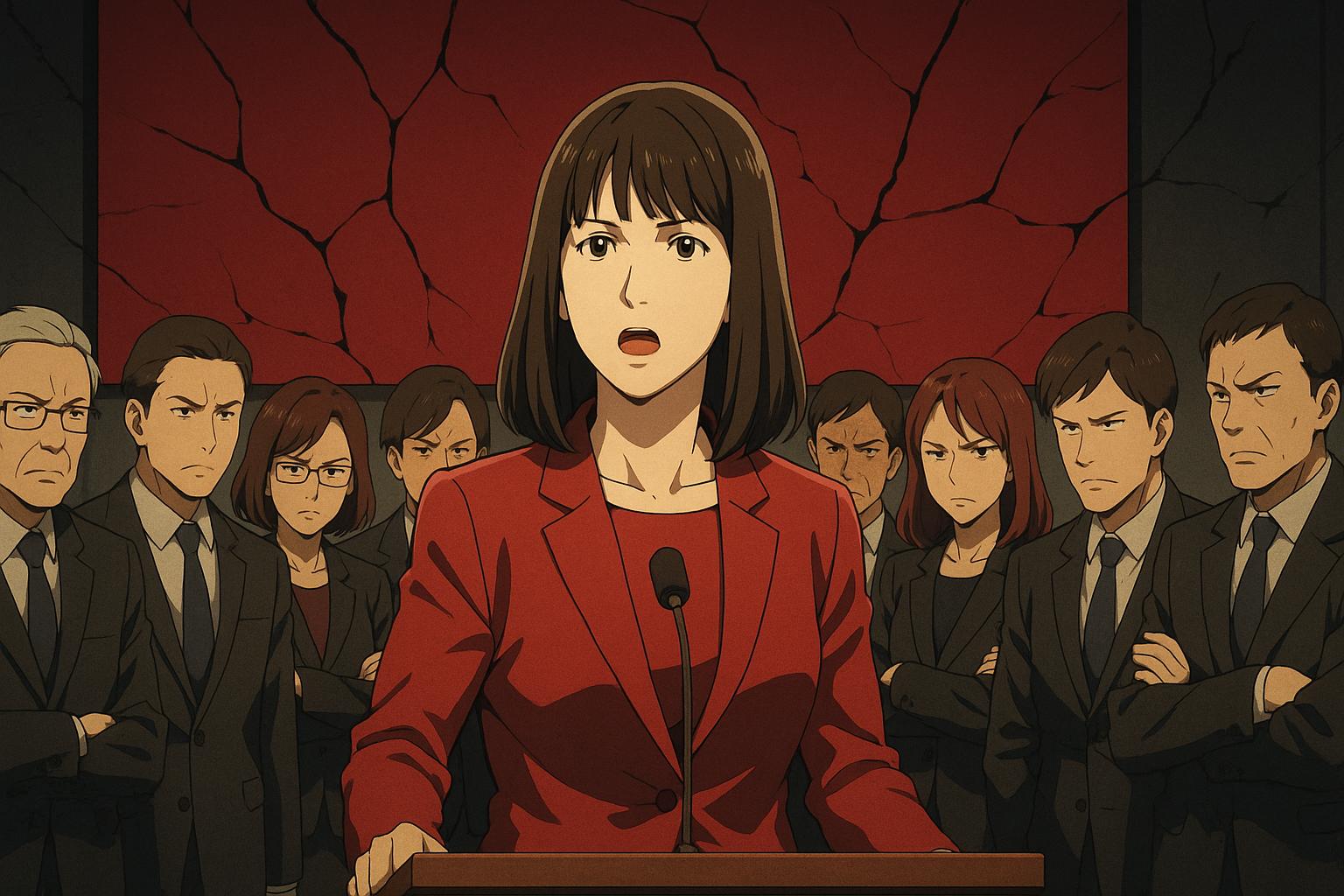Rachel Reeves’ absence from the G7 finance summit and mounting internal disputes over tax policy expose deep fractures within Labour’s leadership, challenging the party’s ability to present a united front during a critical economic period.
During a recent Prime Minister’s Questions (PMQs), Sir Keir Starmer attempted to inject some levity into a tense political atmosphere with a light-hearted jab at a prominent political figure enjoying a holiday. This amusing moment, however, only highlighted the more significant absence of Shadow Chancellor Rachel Reeves. Sitting in a position typically held by Reeves was Yvette Cooper, suggesting a lack of coherence and unity in Labour’s leadership during a critical moment.
Reeves’ absence was particularly glaring, as she missed the G7 finance ministers meeting in Canada—a critical event at a time when economic pressures are mounting on the government. On the same day, troubling news emerged of a dramatic spike in inflation, coupled with indications of a rift between Reeves and Deputy Prime Minister Angela Rayner over tax strategies. This internal discord underscores the growing chaos within Labour as they are challenged to present a decisive economic policy response amidst increasing public scrutiny.
Compounding the day’s missteps, a botched news clip distorted Reeves’ voice, leading to ridicule at a time when Chancellors must project confidence and stability. Starmer’s suggestion of reevaluating winter fuel payments, seemingly made without Reeves’ involvement, raises serious concerns about her authority and the internal dynamics of leadership in the party.
The opposition benches reacted with scornful jeers as Starmer’s pivot indicated Labour’s disarray, leaving the question of whether No 10 has effectively relegated Reeves to a secondary role within her own portfolio. Meanwhile, Cabinet ministers maintained a stoic demeanor, reflecting the discomfort generated by such abrupt public reversals.
Tensions in the Labour camp escalated further as Kemi Badenoch, the Business and Trade Secretary, addressed the U-turn with pointed criticism, drawing attention to the economic instability gripping the nation. Her sharp exchanges with Labour provided a tactical edge, compelling their members to confront growing discontent among their ranks.
Labour’s struggles extend beyond mere economic policy, as they grapple with maintaining a coherent platform. Reeves has explicitly ruled out increasing capital gains tax, even as Rayner criticizes a system perceived to be skewed in favour of the wealthy, which could widen the internal schisms as the party seeks to juggle financial integrity with progressive ideals. Compounding Labour’s woes, discussions have surfaced regarding significant budgetary cuts proposed by Reeves intended to mitigate a staggering £40 billion funding shortfall. Concerns among ministers about potential cuts upwards of 20% in their departments threaten to exacerbate tensions and undermine public services.
As Labour tries to navigate this challenging landscape, clarity in fiscal policy is essential. Reeves advocates for tax cuts and spending adjustments, although advisers caution that these proposed measures might result in the most severe fiscal contraction since 2019. Additionally, as issues surrounding workers’ rights emerge, fractures within the party are becoming increasingly evident, raising doubts about how much of their traditional commitments can withstand the rigours of governance.
The looming question remains whether Reeves can effectively assert her position or if she will continue to be viewed as a mere afterthought amidst the party’s fractious factions. The public and party members alike are watching closely, anticipating how this political drama will unfold against the backdrop of tax policy, electoral sentiment, and the broader economic challenges facing the nation.
Source: Noah Wire Services
- https://www.dailymail.co.uk/debate/article-14737425/QUENTIN-LETTS-day-Chancellor-away-shes-scrap-Rayner-PM-does-dirty.html?ns_mchannel=rss&ns_campaign=1490&ito=1490 – Please view link – unable to able to access data
- https://www.standard.co.uk/news/politics/rishi-sunak-rachel-reeves-angela-rayner-keir-starmer-grant-shapps-b1071021.html – In March 2023, Shadow Chancellor Rachel Reeves indicated that Labour does not plan to increase capital gains tax, despite Deputy Leader Angela Rayner’s criticism of the tax system, highlighting disparities where Prime Minister Rishi Sunak’s income from capital gains is taxed at a lower rate than income. Reeves emphasized that she has no plans to raise capital gains tax, even as Rayner criticized the system for allowing the wealthiest to pay lower tax rates than working people.
- https://www.standard.co.uk/news/politics/rachel-reeves-budget-tax-rises-national-insurance-labour-cabinet-b1188342.html – In October 2024, Chancellor Rachel Reeves announced plans to implement significant spending cuts and tax rises to address a £40 billion funding gap. This led to tensions within the Cabinet, with ministers like Education Secretary Bridget Phillipson expressing concerns over proposed cuts of up to 20% in their departments. Despite these challenges, Reeves emphasized the necessity of these measures to stabilize public finances and protect key services.
- https://www.independent.co.uk/news/uk/politics/reeves-keir-starmer-chancellor-budget-b2630710.html – In October 2024, Chancellor Rachel Reeves faced backlash from Deputy Prime Minister Angela Rayner and other Cabinet members over proposed substantial cuts to departmental spending in her upcoming budget. Some departments were facing cuts of up to 20% as Reeves sought to address a £40 billion funding gap. The disagreements highlighted internal tensions within the Labour government regarding fiscal policies and their impact on public services.
- https://inews.co.uk/news/politics/reeves-rayner-inside-tensions-shape-starmer-government-3062025 – In October 2024, internal tensions within the Labour Party emerged between Shadow Chancellor Rachel Reeves and Deputy Leader Angela Rayner over proposed changes to workers’ rights. While Reeves advocated for policy adjustments, Rayner, who had championed the New Deal for Workers, resisted any dilution of the policy, underscoring the challenges in balancing economic pragmatism with party commitments to workers’ rights.
- https://www.the-independent.com/news/uk/politics/rachel-reeves-budget-taxes-jeremy-hunt-b2588632.html – In October 2024, Chancellor Rachel Reeves indicated that taxes would need to rise to address a £22 billion shortfall in public finances. While she did not specify which taxes would increase, she acknowledged the necessity of tax hikes to stabilize the economy, despite Labour’s previous commitments not to raise certain taxes.
- https://www.gbnews.com/money/spending-cuts-tax-hikes-spring-statement-rachel-reeves – In October 2024, Chancellor Rachel Reeves faced criticism over proposed spending cuts and tax hikes aimed at addressing a £40 billion funding gap. Some ministers expressed concerns that these measures could harm key public services, despite Labour’s promises to reverse years of decline under the Conservatives. Economists warned that the cuts could represent the steepest reductions since 2019.













